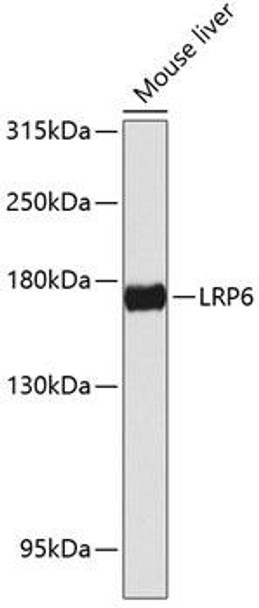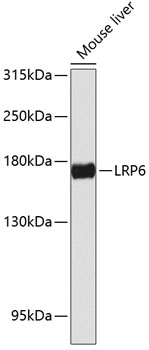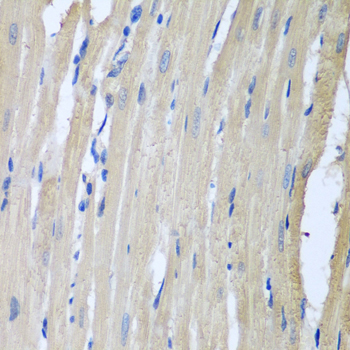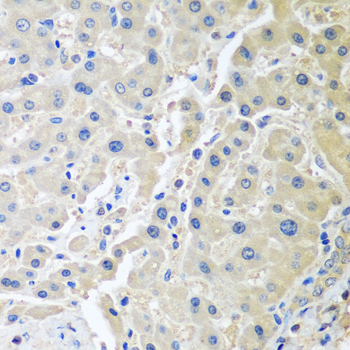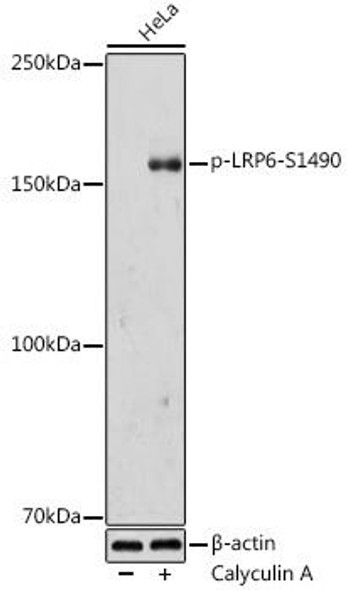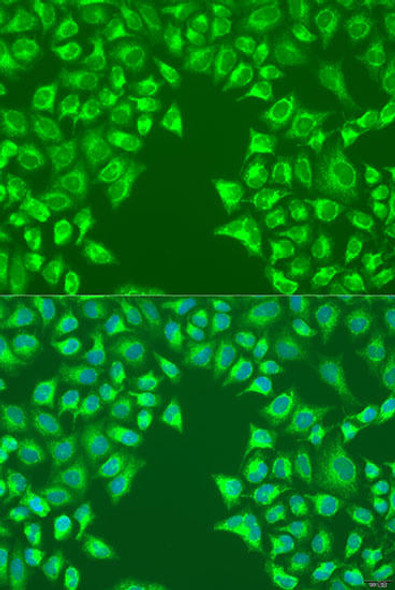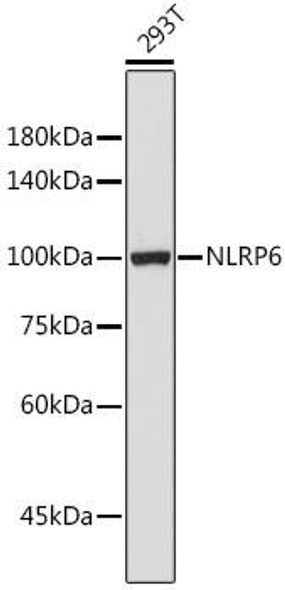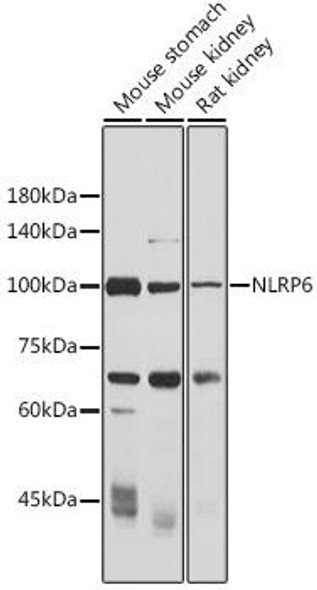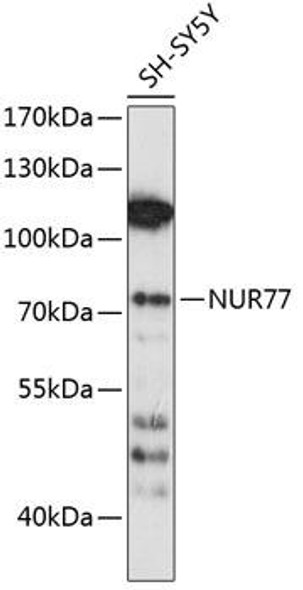Anti-LRP6 Antibody (CAB13324)
- SKU:
- CAB13324
- Product Type:
- Antibody
- Reactivity:
- Human
- Mouse
- Rat
- Host Species:
- Rabbit
- Isotype:
- IgG
- Antibody Type:
- Polyclonal Antibody
- Research Area:
- Cell Biology
Description
Anti-LRP6 Antibody (CAB13324)
The LRP6 Polyclonal Antibody (CAB13324) is a powerful tool for researchers studying the LRP6 protein, which is involved in the Wnt signaling pathway and plays a crucial role in cell growth, development, and differentiation. This antibody, produced in rabbits, shows high reactivity with human samples and has been validated for use in Western blotting applications.LRP6 is a key player in the regulation of cell proliferation and differentiation, making it an important target for studies in developmental biology, cancer research, and regenerative medicine. By detecting and analyzing the LRP6 protein, researchers can gain valuable insights into the mechanisms that control cellular processes and potentially uncover new therapeutic targets for various diseases.
The LRP6 Polyclonal Antibody is an essential tool for investigating the functions of LRP6 in different cellular contexts, allowing researchers to explore its role in disease progression and potentially identify novel pathways for intervention. Its ability to specifically bind to the LRP6 protein makes it an ideal choice for studies aiming to understand the complex signaling mechanisms that drive cellular growth and differentiation.
| Antibody Name: | Anti-LRP6 Antibody |
| Antibody SKU: | CAB13324 |
| Antibody Size: | 20uL, 50uL, 100uL |
| Application: | WB IHC |
| Reactivity: | Human, Mouse, Rat |
| Host Species: | Rabbit |
| Immunogen: | Recombinant fusion protein containing a sequence corresponding to amino acids 20-150 of human LRP6 (NP_002327.2). |
| Application: | WB IHC |
| Recommended Dilution: | WB 1:500 - 1:2000 IHC 1:50 - 1:200 |
| Reactivity: | Human, Mouse, Rat |
| Positive Samples: | Mouse liver |
| Immunogen: | Recombinant fusion protein containing a sequence corresponding to amino acids 20-150 of human LRP6 (NP_002327.2). |
| Purification Method: | Affinity purification |
| Storage Buffer: | Store at -20'C. Avoid freeze / thaw cycles. Buffer: PBS with 0.02% sodium azide, 50% glycerol, pH7.3. |
| Isotype: | IgG |
| Sequence: | APLL LYAN RRDL RLVD ATNG KENA TIVV GGLE DAAA VDFV FSHG LIYW SDVS EEAI KRTE FNKT ESVQ NVVV SGLL SPDG LACD WLGE KLYW TDSE TNRI EVSN LDGS LRKV LFWQ ELDQ PRAI ALDP SSG |
| Gene ID: | 4040 |
| Uniprot: | O75581 |
| Cellular Location: | Endoplasmic reticulum, Membrane, Single-pass type I membrane protein |
| Calculated MW: | 180kDa |
| Observed MW: | 170kDa |
| Synonyms: | LRP6, ADCAD2, STHAG7 |
| Background: | This gene encodes a member of the low density lipoprotein (LDL) receptor gene family. LDL receptors are transmembrane cell surface proteins involved in receptor-mediated endocytosis of lipoprotein and protein ligands. The protein encoded by this gene functions as a receptor or, with Frizzled, a co-receptor for Wnt and thereby transmits the canonical Wnt/beta-catenin signaling cascade. Through its interaction with the Wnt/beta-catenin signaling cascade this gene plays a role in the regulation of cell differentiation, proliferation, and migration and the development of many cancer types. This protein undergoes gamma-secretase dependent RIP- (regulated intramembrane proteolysis) processing but the precise locations of the cleavage sites have not been determined. |
| UniProt Protein Function: | LRP6: Component of the Wnt-Fzd-LRP5-LRP6 complex that triggers beta-catenin signaling through inducing aggregation of receptor- ligand complexes into ribosome-sized signalsomes. Cell-surface coreceptor of Wnt/beta-catenin signaling, which plays a pivotal role in bone formation. The Wnt-induced Fzd/LRP6 coreceptor complex recruits DVL1 polymers to the plasma membrane which, in turn, recruits the AXIN1/GSK3B-complex to the cell surface promoting the formation of signalsomes and inhibiting AXIN1/GSK3- mediated phosphorylation and destruction of beta-catenin. Required for posterior patterning of the epiblast during gastrulation. Homodimer; disulfide-linked. Forms phosphorylated oligomer aggregates on Wnt-signaling. Forms a WNT-signaling complex formed of a WNT protein, a FZD protein and LRP5 or LRP6. Interacts (via the extracellular domain) with WNT1; the interaction is enhanced by prior formation of the Wnt/Fzd complex. Interacts (via the beta-propeller regions 3 and 4) with WNT3A. Interacts (via the beta-propeller regions 1 and 2) with WNT9B. Interacts with FZD5; the interaction forms a coreceptor complex for Wnt signaling and is inhibited by DKK1 and C1orf187. Interacts (via beta propeller region) with DKK1; the interaction inhibits FZD5/LRP6 complex formation. Interacts with DKK2. Interacts with C1orf187/DRAXIN; the interaction inhibits Wnt signaling. Interacts (via the phosphorylated PPPSP motifs) with AXIN1; the interaction recruits the AXIN1/GSK3B complex to cell surface LRP6 signalsomes. Interacts with GRB10; the interaction prevents AXIN1 binding, thus negatively regulating the Wnt signaling pathway. Interacts (via the extracellular domain) with RSPO1; the interaction activates Wnt/beta-catenin signaling. Interacts (via the extracellular domain) with RSPO3 (via the cysteine rich domain); the interaction activates Wnt/beta-catenin signaling. Interacts (via the beta- propeller regions 1 and 2) with SOST; the interaction competes with DKK1 for binding for inhibiting beta-catenin signaling. Interacts with MESD; the interaction prevents the formation of LRP6 aggregates and targets LRP6 to the plasma membrane. Interacts (via the cytoplasmic domain) with CSNKIE; the interaction phosphorylates LRP6, binds AXIN1 and inhibits AXIN1/GSK3B-mediated phosphorylation of beta-catenin. Interacts with MACF1. Decreased levels on WNT3A stimulation. Widely co-expressed with LRP5 during embryogenesis and in adult tissues. Belongs to the LDLR family. |
| UniProt Protein Details: | Protein type:Membrane protein, integral; Receptor, misc. Chromosomal Location of Human Ortholog: 12p13.2 Cellular Component: Golgi apparatus; cell surface; cell soma; early endosome membrane; endoplasmic reticulum; early endosome; extracellular region; integral to membrane; plasma membrane; synapse; cytoplasmic vesicle; caveola; receptor complex Molecular Function:low-density lipoprotein receptor activity; Wnt-protein binding; identical protein binding; protein binding; Wnt receptor activity; protein homodimerization activity; frizzled binding; kinase inhibitor activity; toxin transporter activity; apolipoprotein binding; receptor binding Biological Process: embryonic forelimb morphogenesis; response to peptide hormone stimulus; radial glial cell differentiation in the forebrain; positive regulation of apoptosis; regulation of fat cell differentiation; positive regulation of transcription, DNA-dependent; cerebellum morphogenesis; palate development; Wnt receptor signaling pathway through beta-catenin; thalamus development; embryonic pattern specification; bone remodeling; embryonic hindlimb morphogenesis; Wnt receptor signaling pathway in forebrain neuroblast division; anterior/posterior pattern formation; synaptic transmission; elevation of cytosolic calcium ion concentration; cell-cell adhesion; negative regulation of protein amino acid phosphorylation; response to folic acid; convergent extension; positive regulation of mesenchymal cell proliferation; midbrain development; positive regulation of bone resorption; heart looping; neural crest cell differentiation; cell migration involved in gastrulation; negative regulation of epithelial cell proliferation; embryonic limb morphogenesis; Wnt receptor signaling pathway; external genitalia morphogenesis; neural crest formation; positive regulation of cell cycle; gastrulation with mouth forming second; negative regulation of fat cell differentiation; positive regulation of ossification; odontogenesis of dentine-containing teeth; formation of radial glial scaffolds; cerebral cortex cell migration; embryonic retina morphogenesis in camera-type eye; midbrain-hindbrain boundary development; neural tube closure; negative regulation of protein kinase activity; positive regulation of transcription from RNA polymerase II promoter; positive regulation of transcription factor activity; embryonic digit morphogenesis; embryonic camera-type eye morphogenesis; cerebral cortex development; regulation of ossification Disease: Coronary Artery Disease, Autosomal Dominant 2 |
| NCBI Summary: | This gene encodes a member of the low density lipoprotein (LDL) receptor gene family. LDL receptors are transmembrane cell surface proteins involved in receptor-mediated endocytosis of lipoprotein and protein ligands. The protein encoded by this gene functions as a receptor or, with Frizzled, a co-receptor for Wnt and thereby transmits the canonical Wnt/beta-catenin signaling cascade. Through its interaction with the Wnt/beta-catenin signaling cascade this gene plays a role in the regulation of cell differentiation, proliferation, and migration and the development of many cancer types. This protein undergoes gamma-secretase dependent RIP- (regulated intramembrane proteolysis) processing but the precise locations of the cleavage sites have not been determined.[provided by RefSeq, Dec 2009] |
| UniProt Code: | O75581 |
| NCBI GenInfo Identifier: | 317373385 |
| NCBI Gene ID: | 4040 |
| NCBI Accession: | O75581.2 |
| UniProt Secondary Accession: | O75581,Q17RZ2, |
| UniProt Related Accession: | O75581 |
| Molecular Weight: | 1613 |
| NCBI Full Name: | Low-density lipoprotein receptor-related protein 6 |
| NCBI Synonym Full Names: | low density lipoprotein receptor-related protein 6 |
| NCBI Official Symbol: | LRP6 |
| NCBI Official Synonym Symbols: | ADCAD2 |
| NCBI Protein Information: | low-density lipoprotein receptor-related protein 6; LRP-6 |
| UniProt Protein Name: | Low-density lipoprotein receptor-related protein 6 |
| Protein Family: | Low-density lipoprotein receptor-related protein |
| UniProt Gene Name: | LRP6 |
| UniProt Entry Name: | LRP6_HUMAN |


